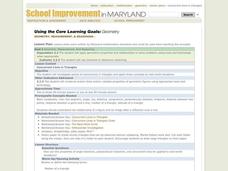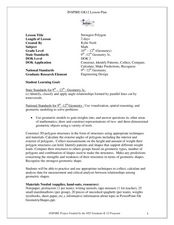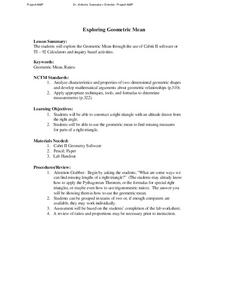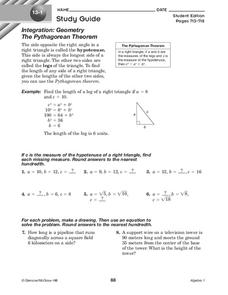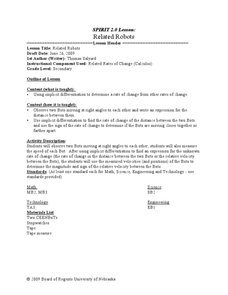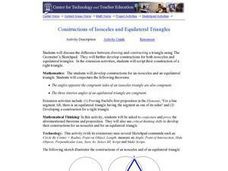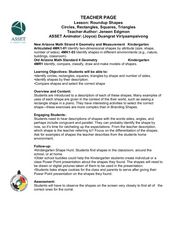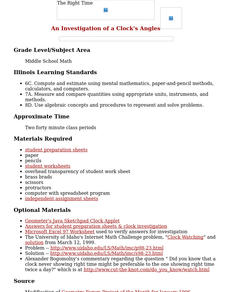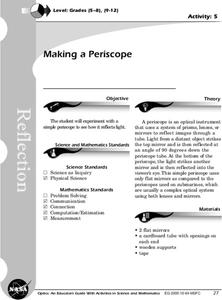Curated OER
Regular Polygons
Fifth graders explore polygons. In this math lesson, 5th graders find examples of regular polygons in the classroom and measure the sides of figures to determine if they are regular polygons.
Curated OER
Geometers Sketchpad Practice
Young scholars create polygons using geometers sketchpad. For this geometry lesson, students construct the interior angles of polygons and label the different points. They estimate and measure the different parts as they draw conclusion.
Curated OER
Dream Bedroom Floor Plan
Students construct using Cabri software. In this geometry lesson, students convert between units and apply the correct measurements to build objects. They create the room virtually and manipulate the shapes to the desired measurements.
Curated OER
Concurrent Lines in Triangles
Students explore the concept of concurrent lines in triangles. In this concurrent lines in triangles lesson, students work in groups to investigate properties of concurrent lines in acute, right, and obtuse triangles. Students use a...
Curated OER
Reflection, Translation, Rotation
In this reflection, translation and rotation worksheet, students read instructions, re-drawing a letter to the given specifications. Answers are included on page 2.
Curated OER
Area Explorations
Young scholars explore the concept of area. In this area lesson, students find the area of irregular shapes with right angles. Young scholars break down each irregular shape into multiple regular shapes in order to find the area. ...
Curated OER
Strongest Polygon
Students define and identify shapes by name. In this geometry lesson, students construct, identify and compare polygons based on the number of sides. They classify each shape based on their angle sum theorem.
Curated OER
Exploring Geometric Mean
Students solve problems using geometric means. In this geometry lesson, students create altitudes in right triangles. They use Cabri software to move the triangle around and observe different sides and angles.
Curated OER
Exploring Geometric Mean
Student identify the solution using geometric mean. In this geometry instructional activity, students create right triangles where the altitude of the triangle is the side containing the right angle. They modify shapes using Cabri...
Curated OER
Ship Shape
Second graders explore shapes. After reading books about shapes, 2nd graders describe the properties of various shapes. They identify shapes if they have been rotated, flipped, or slid. Students create shapes using drawings and geoboards.
Curated OER
Triangle Review
In this triangle review instructional activity, students define what type of triangle is being described, then draw a picture of it. A reference web site is given for additional activities.
Curated OER
Is It There?
Students participate in a lesson designed to illustrate these concepts using simple materials. They use Science process skills to observe, measure, predict, make inferences, and communicate while completing the activity. Proper safety...
Curated OER
The Pythagorean Theorem
In this Pythagorean theorem worksheet, 9th graders solve and complete 8 different problems that include using the Pythagorean theorem to solve. First, they find the missing measure in each right triangle. Then, students make a drawing...
Curated OER
Unit 9 Trigonometry
In this trigonometry worksheet, students find the lengths of triangles. They construct triangles and spirals. Students complete indirect measurement problems. They find the distance between objects and determine the volume of rectangular...
Curated OER
Related Robots
Students solve problems using implicit differentiation. In this calculus lesson, students take the derivative to calculate the rate of change. They observe two robots and draw conclusion from the data collected on the two robots.
Curated OER
NON-EUCLIDEAN GEOMETRY.
Students study relationships between angles, side lengths, perimeters, areas and volumes of similar objects. In this lesson students also create and critique inductive and deductive arguments concerning congruency, similarity and the...
Curated OER
Constructions of Isosceles and Equilateral Triangles
Learners explore the difference between drawing and constructing a triangle utilizing The Geometer's Sketchpad on the computer. They create, develop and script constructions for both isosceles and equilateral triangles. Each student has...
Curated OER
Motions In Geometry
In this motions in geometry worksheet, students draw translations, rotations, and reflections. This three-page worksheet contains examples, instructions, and 6 problems. The last page contains answers.
Curated OER
Triangle Inequalities
In this geometry instructional activity, students use the inequality theorem to figure out if three segments will make a triangle. They are given the measures of two segments and must figure out the third segment on their own. There are...
Curated OER
Geometry: Lesson 10
Eighth graders investigate the Pythagorean theorem and how it is used in geometry. Measurements for different triangles is given and then students must solve problems in order to practice using the formula.
Curated OER
Plenty of Pythagoras
Using a twelve foot knotted rope, students form a 3-4-5 right triangle. Following a discussion of observations about the lengths of the sides of the triangle, students use grid paper, scissors and a centimeter ruler to draw and measure...
Curated OER
Circles, Rectangles, Squares, Triangles
Students identify, compare and classify the various shapes. For this shapes lesson, students listen to descriptions of shapes with words such as sides, angles, congruent, and parallel. Students then give the teacher examples of shapes...
Curated OER
The Right Time
Students compute and estimate using mental mathematics, paper-and-pencil methods, calculators, and computers. They measure and compare quantities using appropriate units, instruments and methods. They utilize worksheets imbedded in this...
Curated OER
Making a Periscope
Students experiment with a simple periscope to see how it reflects light. They draw a diagram of the path a ray of light follows as it travels from an object, through the periscope, and into your eye.





